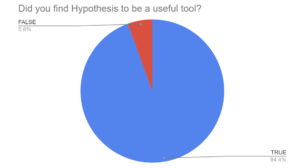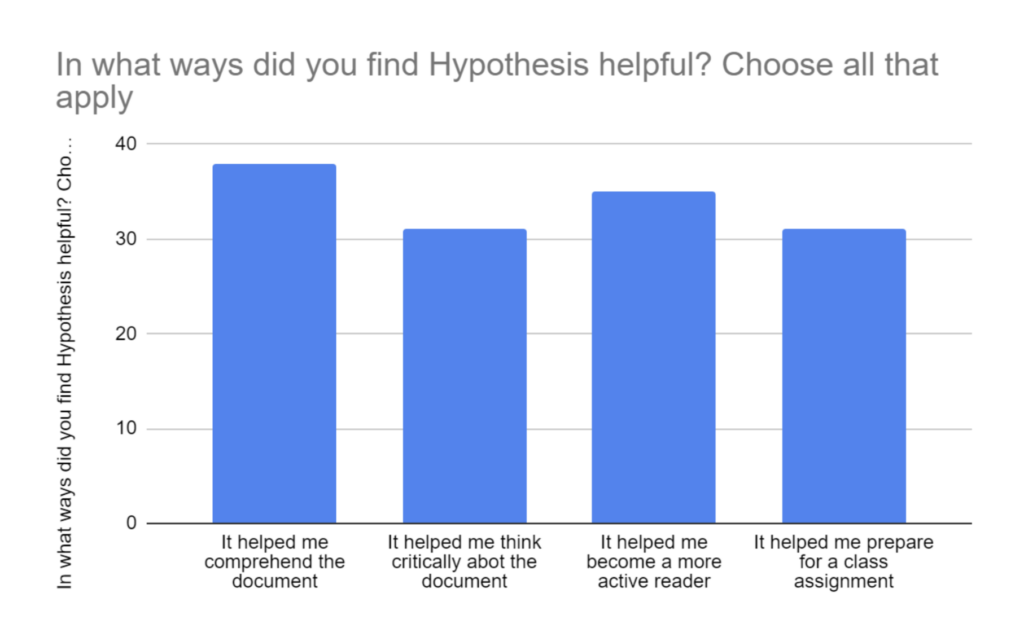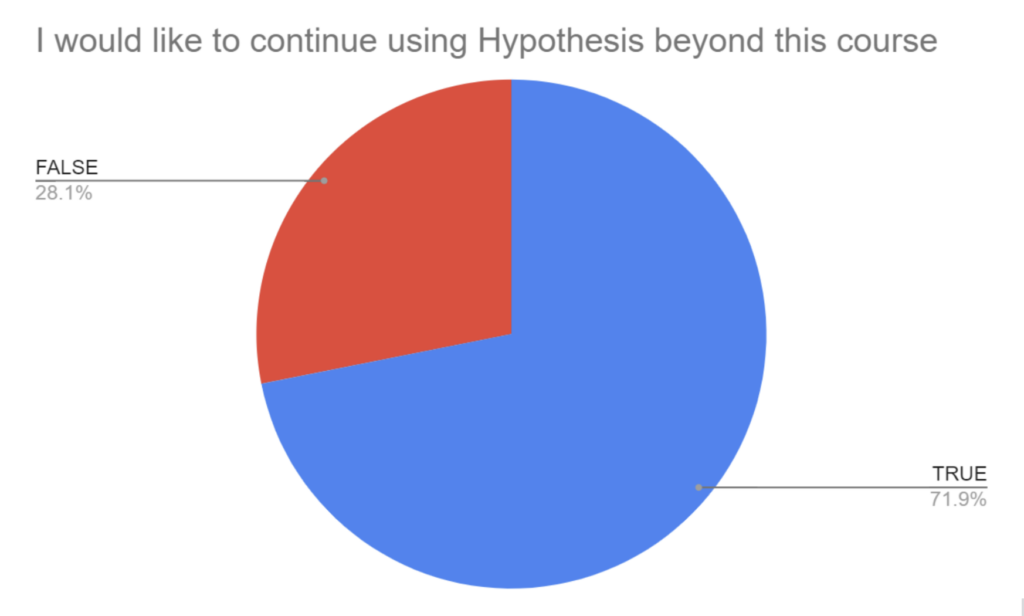
Jennifer Jozwiak
Faculty Member, Allan Hancock College
Introduction
Allan Hancock College, a primarily Hispanic college serving many first-generation students, is committed to enhancing the student learning experience. Many students use English as their second language and found the materials and assignments challenging to grasp. The college also struggled with engaging students in active and collaborative learning, and wanted to create a better learning experience for students. Traditional teaching methods were not fully addressing the needs for deeper comprehension, critical thinking, and effective communication among students.
“I have a lot of students that moved here when they were in junior high, some even in high school. This has led to significant barriers in reading and writing which ultimately impact comprehension and student outcomes.”
– Jennifer Jozwiak, a faculty member at Allan Hancock
Solution
Hypothesis was introduced as a tool to bridge these gaps. It was utilized in courses like ENGL 110 “Grammar for College and Career” (face to face) and ENGL 100 “Writing in Career/Tech Fields”, (online) in both online and face-to-face settings, to facilitate interactive annotation and enhance discussion and collaboration.
The implementation led to significant improvements in student outcomes, specifically comprehension and critical thinking skills. Perhaps most strikingly, an in-depth survey conducted among the students utilizing Hypothesis underscored the impact on their overall learning journey. The ENGL 101 (online) course specifically was a freshman composition class, and incoming students needed more assistance in developing the skill set required to excel in college-level writing. This class was also crucial for students, as passing it was required to transfer to a four-year degree school.
Survey Results
- Overall Usefulness: Students in both online and face-to-face classes found Hypothesis useful. From the total responses, 95% stated they found Hypothesis to be a useful tool in their course.

- Comprehension and Critical Thinking: When asked why they found Hypothesis useful, comprehension and critical thinking were the main factors. 60% of ENGL 110 students reported improved comprehension and critical thinking skills. In ENGL 100, 67% also felt their comprehension improved.

- Continue using Hypothesis: Up to 72% of students across courses felt they would like to use Hypothesis in additional courses.

- Collaboration: Between 27% and 50% of students across classes observed enhanced collaborative skills.
- Connection with Peers and Faculty: 70% to 91% of students felt more connected to classmates, and 80% to 100% felt closer to their instructors.
Student Feedback and Perspectives
Assignment Preparation: The majority of students in ENGL 110 (90%) found Hypothesis helpful in preparing for assignments. One student remarked, “It streamlined the process of understanding and discussing assignments.”
Proofreading and Collaboration: Students in ENGL 110 appreciated Hypothesis for proofreading practice and peer collaboration. A student expressed, “It helped me read the text carefully and identify errors, understanding my classmates’ perspectives.”
Enhanced Comprehension and Analysis: Students experienced a marked improvement in their ability to comprehend and critically analyze texts. As one student explained, “I found myself analyzing the texts I read in a more intimate and in-depth way after using it. It encourages you to re-read articles and educational texts, break them down, ask questions, and highlight what is important.”
Improved Understanding of Assignments: The tool was particularly effective in clarifying assignment requirements. Students felt more confident in their grasp of the tasks, especially when dealing with complex topics. One student noted, “If a classmate was having trouble understanding an assignment, such as a paper with a vast topic, I would definitely recommend Hypothesis because when I used it, it would always give me a better understanding of the assignment.”
Collaboration and Peer Engagement: Hypothesis facilitated better collaboration among students. It provided a platform for students to engage with their peers, share insights, and gain diverse perspectives on the course material. One student mentioned, “I really enjoy collaborating with my peers and getting clarification from our professor if I have certain questions about a writing assignment.”
Ease of Use and Versatility: Students appreciated the user-friendly nature of Hypothesis and its applicability to various tasks. The tool’s simplicity and utility in different contexts were highlighted as significant advantages. One student noted, “The tool is easy to understand and very useful for different tasks”.
Recommendation to Peers: The overarching theme is the students’ willingness to recommend Hypothesis to peers and classmates. This recommendation stems from their experiences and the tangible benefits they derived from using the tool. As one student explained:
“In my opinion, I feel that the Hypothesis tool was extremely helpful for me as a student. I really enjoy collaborating with my peers and getting clarification from our professor if I have certain questions about a writing assignment. I would definitely recommend hypothesis to a friend because for me, this tool allowed me to engage with my peers and understand what others also struggle with. It is a feeling of relief to know you are not the only one not understanding something. Being able to talk and interact with other classmates helps with future class discussions and gain awareness of guidelines.”
Conclusion
The student survey findings confirm that Hypothesis has addressed some of the challenges faced by the college, creating a learning environment that promotes active, collaborative learning, and cultivates deeper comprehension and critical thinking skills among students. This successful integration resonates with the institution’s vision of providing student-centered education, ultimately elevating academic performance and fostering meaningful engagement.
Jennifer captured the impact by sharing, “Hypothesis has met our diverse student body’s needs, promoting active, collaborative learning, and enhancing comprehension and critical thinking. It’s helped break down barriers for students and allow them to engage more with course materials.”
Ready to give students a whole new way to engage with scholarly content? Fill out the form below to get started:
